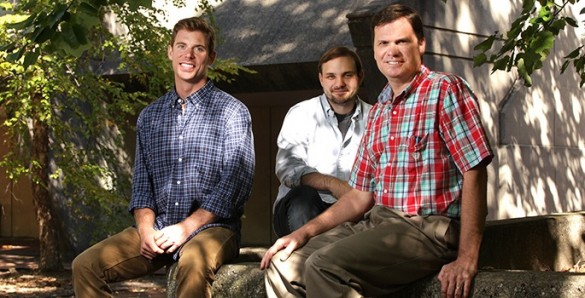
Drew Harmata and Jon Page, graduate students working in the laboratory of Scott Guelcher, associate professor of chemical and biomolecular engineering, will pitch their product – a synthetic wound healing foam – to entrepreneurs and guests March 22 at The Tech Museum of Innovation in San Jose, Calif.
Harmata and Page are one of 17 student teams selected to present at Open Minds, a favorite event that caps off the annual conference of the National Collegiate Inventors and Innovators Alliance. NCIIA is an intensive two-day conference for practitioners of technology entrepreneurship in higher education.
The students are pursuing the development of PoraDerm, a unique synthetic, biodegradable foam as a new treatment for deep skin wounds such as chronic foot ulcers caused by diabetes and pressure ulcers. They have formed PEURegen Inc. to commercialize PoraDerm as a therapeutic product.
“The PEURegen group appreciates the opportunity to attend the Open Minds conference, present the synthetic skin scaffold technology [PoraDerm], and connect with potential interested parties in San Jose. At this event, we hope to continue to learn how to best translate this technology from bench-to-bedside ourselves,” Harmata said.
PoraDerm is a prefabricated skin graft made of a porous polyurethane that has structural properties similar to those of native skin. It can be manufactured as a foam that can fill deep wounds in one easy application, and it provides a scaffold for skin regenerating cells to infiltrate, remodel, and replace with healthy skin.
Harmata and Page said PoraDerm’s synthetic nature makes it an attractive material in that it has no potential of transmitting infectious diseases, does not induce a prolonged immune response, and subsides regulatory constraints that accompany biologics-based therapies.
The Open Minds event will showcase cutting-edge innovation from NCIIA’s best student teams. NCIIA funds and trains faculty and student technology innovators.
The Poraderm project won a NCIIA E-Team Program first-stage award of $5,000 in 2012. The E-Team Program provides early-stage support and funding of up to $75,000 for collegiate entrepreneurs working on market-based technology inventions.
Last year Harmata and Page were one of nine student teams that won a $15,000 second-stage award and qualified to compete in the third stage of the competition where they are given the opportunity to pitch their innovations to investors and can receive an investment up to $50,000.
In April Page and Harmata will apply for the E-Team Program’s third stage competition.